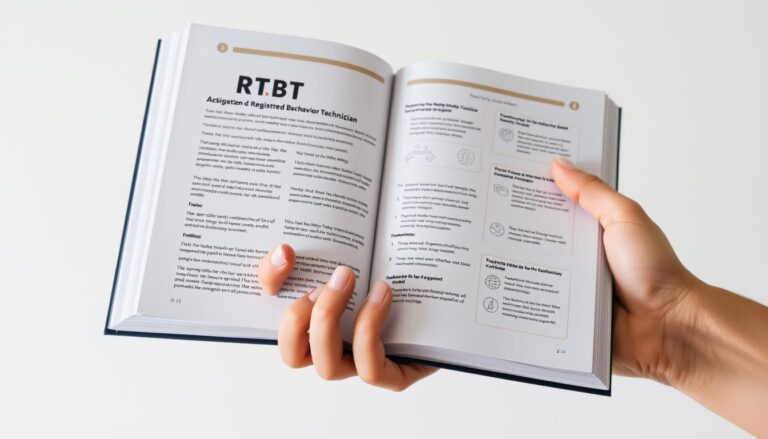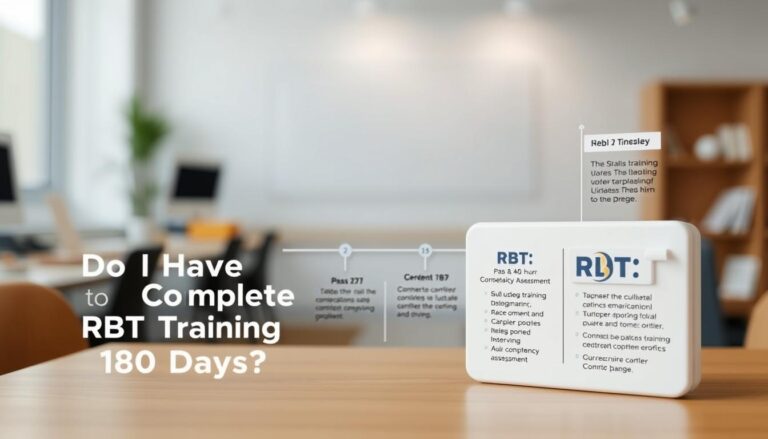Sibling of an RBT? Here’s the Challenge You Might Face
Family life can get complicated when a Registered Behavior Technician (RBT) is helping with autism treatment. It’s important to understand the emotional and psychological hurdles that siblings face. These challenges are often overlooked.
RBT siblings deal with unique issues because of the intense focus on autism care. This can change family routines, emotional interactions, and how attention is shared. These changes can cause stress for everyone in the family.
Children with a sibling who is an RBT might feel left out or have mixed feelings about the care process. These feelings can shape their view of family support and their own roles in the home.
It’s key to recognize and tackle these challenges to keep family bonds strong. Getting professional help and talking openly can help siblings cope with the complexities of autism treatment and family life.
Understanding the Role of Registered Behavior Technicians in Family Dynamics
Registered Behavior Technicians (RBTs) are key in helping families deal with behavioral issues. They change how families interact, making it easier to understand and manage RBT sibling dynamics. They also help meet the special needs of each household.
RBTs are experts who work with families to use specific strategies for behavior. They do more than just therapy. They become a big part of supporting families.
Key Responsibilities in Home Settings
The main jobs of RBTs at home include:
- Implementing behavior intervention plans
- Collecting data on client progress
- Providing direct skill training
- Coaching family members on intervention techniques
Impact on Family Structure and Routines
RBTs help families adjust to new ways of interacting. They make sure everyone in the family gets the support they need.
Daily Interactions Between RBTs and Family Members
For RBTs to work well, they need to talk clearly and work together. Family members learn to support the RBTs. This creates a positive environment for everyone.
Understanding RBT sibling dynamics means seeing how each family member plays a part in therapy.
What is One Problem with a Sibling of an RBT
Families with Registered Behavior Technicians (RBTs) face special challenges. Siblings of kids getting behavioral help often feel left out and ignored.
Siblings in RBT families deal with big issues:
- Less attention from parents because of therapy
- Feeling confused about their sibling’s needs
- Jealousy or resentment can grow
- Stress and changes in family life
These siblings live in a complex emotional world. They feel a mix of love, confusion, and sometimes neglect. While the child getting help gets all the attention, the others might feel like they’re not as important.
| Emotional Impact | Potential Manifestations |
|---|---|
| Attention Deficit | Seeking validation through disruptive behaviors |
| Emotional Complexity | Experiencing guilt about their feelings |
| Family Dynamic Shifts | Adjusting to changed household routines |
It’s important to understand these challenges. This way, we can create a fair environment for all kids, not just those getting special help.
Emotional Challenges Faced by Siblings in RBT Families
Living with a Registered Behavior Technician (RBT) can be tough for siblings. They need understanding, patience, and special support to cope.
Siblings in RBT families face unique emotional challenges. These challenges can make it hard for kids to adjust to a family member getting special behavioral help.
Dealing with Attention Disparity
Children in RBT families often get less attention. The focus on a sibling getting help can make them feel:
- Emotionally neglected
- Less connected to parents
- Competitive
Processing Complex Emotions
Siblings may feel many strong emotions. These can include:
| Emotion | Potential Impact |
|---|---|
| Jealousy | Feeling left out by sibling’s care |
| Confusion | Not understanding the behavioral help |
| Guilt | Feeling bad about their feelings |
Building Resilience and Understanding
It’s key for siblings to develop emotional smarts. Good communication and family support help them deal with tough feelings.
Getting help from professionals and family therapy is vital. It helps make sure everyone in the family feels loved and supported.
Navigating Time and Attention Distribution in the Family
It can be tough to balance time between kids in a family with an RBT client. To support RBT siblings, we need to be intentional and thoughtful. This ensures every child feels loved and heard.
Parents are key in making family life fair. Here are ways to help RBT siblings:
- Scheduling dedicated one-on-one time with each child
- Creating individual activities that highlight each child’s unique strengths
- Implementing a fair rotation of special moments and attention
Intentional communication becomes the cornerstone of healthy family relationships. Parents can tackle emotional challenges by being aware. This way, they can avoid feelings of neglect or resentment.
Here are some practical ways to support siblings:
- Establishing weekly family meetings where everyone shares experiences
- Developing individual reward systems that recognize each child’s contributions
- Encouraging open dialogue about feelings and expectations
Professional counselors suggest making family life open and fair. This way, everyone’s needs are seen as equal. It keeps emotions balanced and avoids long-term relationship problems.
Common Behavioral Changes in Siblings of RBT Clients
Families with RBT clients often see changes in sibling relationships. It’s important to watch for these changes during treatment. This helps understand how RBT affects siblings.
RBT can bring up different challenges for siblings. These challenges can make family life more complex.
Signs of Adjustment Difficulties
Siblings of RBT clients might show several signs of adjustment:
- Increased emotional sensitivity
- Changes in social interactions
- Attention-seeking behaviors
- Potential academic performance shifts
Positive and Negative Behavioral Patterns
Siblings can show a wide range of behaviors. These can be both challenges and chances for family growth.
| Behavioral Category | Positive Patterns | Negative Patterns |
|---|---|---|
| Emotional Response | Increased empathy | Withdrawal or resentment |
| Family Interaction | Supportive attitude | Competitive behavior |
| Personal Development | Enhanced understanding | Potential stress responses |
By recognizing these patterns, families can tackle challenges early. This supports healthy sibling relationships during RBT interventions.
Creating Balanced Family Time Despite RBT Sessions
Families with Registered Behavior Technician (RBT) support often find it hard to keep a balance. It’s important to find ways to support RBT siblings. This helps create a happy home for everyone.
Planning quality family time is key. It’s about finding creative ways to make sure all siblings feel included. This is true for both therapy sessions and family activities.
- Schedule dedicated one-on-one time with each child
- Create inclusive family activities that accommodate everyone’s needs
- Establish predictable family rituals that build connection
- Rotate special privileges and attention among siblings
Parents can do a lot to make sure no child feels left out. Intentional communication and emotional awareness are very important. They help keep the family together.
| Strategy | Purpose | Implementation |
|---|---|---|
| Family Activity Rotation | Ensure equal participation | Weekly special activity chosen by different family members |
| Shared Learning Time | Build understanding | Family discussions about RBT sessions and progress |
| Individual Attention Blocks | Address emotional needs | Scheduled one-on-one time with each child |
By focusing on inclusivity, families can turn RBT support into a chance for closer bonds. This leads to better understanding and connection among all family members.
Supporting Siblings Through the RBT Integration Process
Adding a Registered Behavior Technician (RBT) to your family can be tough for siblings. It’s important to be kind and plan carefully to make sure everyone feels important and supported.
Families dealing with RBT help need strong plans to support their siblings. Knowing how each sibling feels helps make a welcoming and caring space for everyone.
Communication Strategies
Talking openly and truthfully is key to helping siblings get the RBT. Here are some important steps:
- Explain the RBT’s role in simple terms
- Have regular family talks
- Let siblings ask questions and share their feelings
- Practice active listening
Building Support Systems
It’s vital to build a strong support network for your family’s health. Good strategies include:
| Support Method | Benefits |
|---|---|
| Family Counseling | Help from professionals for emotional issues |
| Sibling Support Groups | Meeting others who face similar challenges |
| Individual Therapy | Personal emotional support |
By using these methods, families can build a caring space. This space values each person’s feelings and experiences during RBT times.
Managing Sibling Expectations and Responsibilities
Understanding RBT sibling dynamics is key to family harmony. Siblings of kids getting Registered Behavior Technician (RBT) help face special challenges. They need careful handling.
It’s important to involve siblings in family tasks in ways that fit their age. Parents can share duties in a way that doesn’t stress out the younger ones.
- Create clear, realistic expectations for each family member
- Establish age-appropriate helping roles
- Recognize individual strengths and limitations
- Rotate family support responsibilities
Managing sibling expectations needs open talks and emotional smarts. Clear talks about family life help kids grasp their roles in the family.
Supporting siblings involves several steps:
- Schedule regular family meetings
- Validate individual feelings and experiences
- Provide dedicated one-on-one time with parents
- Encourage peer support networks
By using these strategies, families can build a fair environment. This environment supports all members, focusing on the needs of kids getting RBT help.
Addressing Feelings of Jealousy and Resentment

Dealing with sibling rivalry in RBT families can be tough. When one child gets a lot of behavioral support, others might feel confused or resentful. It’s key to understand these feelings to keep the family happy.
To handle RBT sibling issues, we need to be kind and smart. We must see that each child’s feelings are real and important.
Recognition and Validation of Emotions
It’s vital to validate emotions in sibling relationships. Parents and caregivers should make a safe space for kids to share their feelings without fear of being judged.
- Listen actively to siblings’ concerns
- Acknowledge their unique emotional experiences
- Avoid minimizing their feelings
- Provide individual attention and support
Healthy Expression Techniques
Teaching kids how to express their feelings in a good way can change things. Emotional intelligence is a strong tool for dealing with family issues.
- Encourage verbal communication
- Practice empathy and perspective-taking
- Use age-appropriate emotional regulation strategies
- Consider family counseling or support groups
By tackling jealousy and resentment early, families can build a supportive space. This space helps each child feel emotionally safe and valued.
Building Positive Relationships Between Siblings and RBTs
Creating strong, supportive relationships between siblings and Registered Behavior Technicians (RBTs) is key for family harmony. It’s important to understand the emotional needs of each family member. This helps in building positive bonds.
Supporting RBT siblings involves several important steps:
- Open communication about the therapeutic process
- Inclusive involvement in treatment activities
- Establishing clear boundaries and expectations
- Recognizing individual contributions to family support
RBTs are vital in connecting family members. Intentional engagement makes siblings feel valued and understood during therapy.
| Interaction Strategy | Potential Benefits |
|---|---|
| Explain therapy goals | Increases understanding and reduces confusion |
| Include siblings in appropriate activities | Builds family cohesion and mutual support |
| Validate sibling emotions | Promotes emotional intelligence and empathy |
Building successful relationships takes patience, empathy, and effort from RBTs and family. By focusing on mutual respect and understanding, families can grow together in a supportive environment.
Educational Resources for Families with RBT Support
Finding the right help for families with a Registered Behavior Technician (RBT) can be tough. It’s key to know the best educational tools. These tools help in creating strategies for RBT siblings and adjusting to family life.
Families looking to support RBT siblings have many educational options. These options fit different ages and learning ways.
Age-Appropriate Learning Materials
Learning materials should match a child’s age and needs. There are various tools to help siblings grasp their family’s unique situation:
- Interactive picture books explaining autism for younger children
- Animated videos demonstrating behavioral therapy concepts
- Workbooks designed to help siblings express their feelings
- Online interactive modules with age-specific content
Family Education Programs
Family education programs offer structured support for everyone at home. They usually include:
- Workshops explaining ABA therapy principles
- Communication skill-building sessions
- Emotional intelligence training
- Peer support group connections
By using the right educational resources, families can build a supportive space. This space helps siblings understand, adapt, and grow with their RBT-supported family member.
Maintaining Family Unity During RBT Interventions

Dealing with RBT sibling challenges needs careful thought about family relationships. Families with Registered Behavior Technicians face special issues. These can test their emotional strength and togetherness.
To keep family unity during RBT, several strategies are key:
- Create dedicated family time that includes all members
- Develop open communication channels
- Acknowledge individual emotional needs
- Implement fair attention distribution
Sibling struggles in RBT families can be tough. Kids might feel left out or less important when a family member gets special help. Proactive communication is key to tackling these emotional issues.
Here are some ways to keep family bonds strong:
- Weekly family meetings to discuss feelings and experiences
- Rotating special one-on-one time with each family member
- Creating inclusive activities that engage everyone
- Celebrating individual achievements equally
Professional RBT support can help families find ways to meet everyone’s needs. The aim is to make sure every family member feels valued, heard, and connected.
Professional Support Options for Siblings
Having a sibling with special needs can be tough. Families look for help to deal with these challenges. They want to find ways for their kids to handle these situations well.
Professional help is key for siblings in these situations. It offers the tools they need to understand and manage their feelings. This support helps them cope with the unique family dynamics.
Counseling and Therapy Services
Specialized counseling is very helpful for RBT siblings. Trained therapists can work with families. They help in many ways.
- They offer individual counseling to help kids grow emotionally.
- Family therapy improves how everyone talks to each other.
- They teach siblings how to cope with their feelings.
- They also teach emotional control techniques.
Support Groups and Networks
Meeting others who face similar challenges can change a sibling’s life. Support groups offer:
- A safe place to talk about feelings.
- Chances to learn from others.
- Understanding and support from peers.
- Help for the whole family to learn and grow.
Professional support helps siblings become stronger and more emotionally smart. It helps them deal with the special challenges of their family life.
Long-term Effects on Sibling Development and Growth
Understanding RBT sibling dynamics shows a journey of growth and emotional strength. Kids in families with Registered Behavior Technicians face special challenges. These can shape their character and how they interact with others.
RBT sibling challenges lead to significant personal growth. These experiences help develop:
- Enhanced emotional intelligence
- Deeper empathy and compassion
- Advanced problem-solving skills
- Increased adaptability
Studies show that siblings in RBT families grow strong psychologically. They learn to handle complex family situations. This can help them develop strong social and emotional skills later on.
Key developmental benefits include:
- Heightened sensitivity to others’ needs
- Improved communication skills
- Greater patience and understanding
- Resilience in challenging situations
While challenges exist, the chance for positive growth is big. These siblings often grow up to be more mature and caring. They learn the value of supporting their family through tough times.
Getting help from professionals and family support is key. It helps siblings grow and thrive with their family’s unique journey.
Strategies for Creating Inclusive Family Activities

When a child gets Registered Behavior Technician (RBT) services, it can be tough for families. Making sure all family members feel included is key. This means finding activities that meet everyone’s needs.
To make activities inclusive, parents need to be creative and plan well. Here are some ways to reduce rivalry and bring siblings closer:
- Plan family game nights that everyone can enjoy, no matter their abilities.
- Set up reward systems that celebrate each child’s wins.
- Make sure each child gets special time with a parent.
- Find hobbies or interests that everyone can share.
Handling sibling rivalry in RBT families needs a strong plan. Communication is the key to understanding. It’s important to let siblings talk about their feelings openly.
Activities that everyone can do together can help close emotional gaps. Try these ideas:
- Art workshops where everyone can be creative.
- Cooking classes where everyone helps out.
- Team sports or group activities that get everyone moving.
- Family storytelling sessions where everyone shares.
The aim is to make sure every family member feels important, heard, and connected. With the right strategies, families can turn challenges into chances for growth and understanding.
Conclusion
Having a sibling with autism and working with a Registered Behavior Technician (RBT) can be tough. What’s one problem? It’s the emotional mix of confusion, jealousy, and needing equal family time.
To deal with these issues, we need to talk openly, be empathetic, and get professional help. By doing this, families can turn challenges into chances for growth. It’s about making sure everyone feels heard and understood.
Getting help from experts, joining support groups, and going to counseling can help a lot. These steps help siblings grasp their family’s unique situation. With education, patience, and the right advice, families can create a caring space for everyone.
The path of supporting a sibling with autism is about learning, kindness, and being flexible. With the right support and attitude, families can build stronger bonds. They can celebrate each person’s strengths and their shared experiences.







